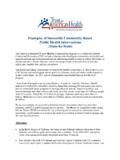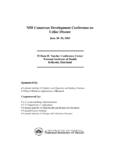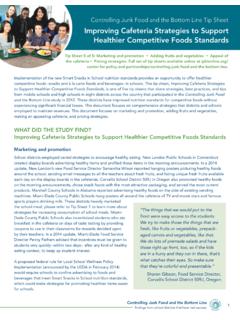Transcription of joel marion - Amazon Web Services
1 2 JOEL MARION37 FRUITS THAT CAUSE BELLY FLABA number of national and international health organizations laud the benefits associated with a diet rich in colorful fruits and vegetables and recommend that folks increase their consumption to reduce the risk of developing lifestyle-related conditions, including overweight and 3 Despite the myriad benefits, many health professionals often recommend that folks limit fruit intake when they re trying to lose weight, and fitness pros may go so far as to suggest the complete elimination of fruit from the diet when trying to lose , recommendations for fruit intake get grouped together with vegetables, and this can lead folks to believe that the two are synonymous.
2 It is fair to say that fruits and vegetables may not be identical in nutritional value, and as a result, they shouldn t be lumped together in a single category. For instance, vegetables typically contain fewer calories and carbohydrates per serving than fruits, which contain more naturally-occurring sugar. With that being said, steadily-rising rates of overweight and obesity have far more to do with overconsumption of refined carbohydrates and added sugars than they do with eating too much Nutrient and Energy DensityNutrient density refers to the amount of key, healthful nutrients per calorie of food, and just like vegetables, fruits are nutrient dense, rich in important micronutrients ( , vitamins and minerals), fiber, and health-promoting, disease-fighting phytochemicals, which act as potent antioxidants that help combat free radicals and reduce oxidative stress.
3 Because whole fruits are also a very good source of dietary fiber and they have high water content, they are considered low-energy-dense foods, which means that they contain a relatively low amount of calories per unit of of these factors play a crucial role in optimizing health and weight management. In fact, some studies suggest that how much you eat daily is regulated by the weight of the food rather than by a certain number of Along those lines, researchers have found that when folks consume low-energy-dense foods, they feel satisfied earlier and those feelings of fullness persist for relatively longer periods of time despite reductions in calorie intake.
4 In other words, diets rich in low-energy-dense foods like fruits and vegetables allow folks to eat more food, which leads to greater feelings of density is defined as the relationship of calories to the weight of food ( , calories per gram). Foods like oils, bacon, butter, cookies, crackers, junk food, fast food, etc., are generally considered high-energy-dense foods ( , 4 9 calories per gram by weight); on the contrary, most fresh fruits are considered low-energy-dense foods ( , calories per gram, by weight), as they tend to have a high water content and are very good sources of fiber, which are two important factors reducing energy density.
5 Fiber itself has a relatively low-energy density, providing only about calories per gram. As mentioned, fruit is also a very good source of fiber, which can promote a healthy digestive tract and regularity, improve carbohydrate management ( , slowed gastric emptying), promote satiety, reduce calorie intake, and enhance weight Simply put, fiber is a nutrition all-star, and not surprisingly, researchers have linked low fiber intakes to increased risk for diabetes and ,8 What s more, studies consistently demonstrate that diets higher in fiber help with weight loss and weight Fruit Alone Promote Weight Loss?Fruits are nutrient dense, low-energy-dense foods, rich in important phytochemicals, and packed with satiating fiber, but what does the research say?
6 Is there any evidence that suggests that fruits can help promote weight loss? In a study published in the American Journal of Clinical Nutrition, researchers from Penn State University found that overweight women who focused on increasing their intake of low-energy-dense foods ( , fruits and vegetables) lost nearly 25% more weight over the course of one year compared to women who were instructed to follow a reduced-calorie diet alone. The women who focused on eating more fruits and vegetables ended up consuming MORE food (despite consuming fewer calories) and experienced greater 5satiety. The researchers concluded, Reducing dietary energy density, particularly by increasing fruit and vegetable intakes, is an effective strategy for managing body weight while controlling hunger.
7 10 In another study published in the journal Nutrition & Diabetes, researchers found that greater consumption of fruits and vegetables during weight loss efforts is correlated to more weight and fat A number of other studies have found an inverse association between fruit and vegetable intake and body weight. In other words, folks who consume more of these low-energy-dense foods weigh less, and these studies demonstrate that advice to increase fruit and vegetable consumption is an effective strategy for weight ,13 Further, researchers from the University of Alabama have found that folks who eat more fruits and vegetables are better able to maintain their weight loss progress after achieving their goal you can tell, many of these studies group fruits and vegetables into a single category, but what about the role of fruits alone in fat loss and weight management?
8 That s precisely what researchers from the University of Denmark set out to uncover in their review published in the journal Obesity Reviews, and to the dismay of militant health gurus, the overwhelming majority of the research suggests an inverse relationship between fruit intake and body one study, researchers from the School of public Health at the University of Minnesota examined the dietary habits of over 1,800 overweight men and women for two years, and they found that increased fruit intake was associated with significantly decreased body In another study published in the journal public Health Nutrition, Dutch researchers analyzed the nutrition habits of 288 men between the ages of 50 and 65 for five years, and they found that decreased fruit intake was significantly related to increased body weight and waist In a study published in the journal Appetite, researchers from Brazil compared the effects of adding fruit ( , apples or pears) or oats on calorie consumption and body weight in overweight women.
9 Over the course of 10 weeks, the researchers found that women who added three daily servings of fruit to their usual diets lost over 5 times more weight than women who added oats, despite the same number of calories and fiber in the fruit and a recent study published in Nutrition Journal, researchers from Denmark played devil s advocate to see if removing fruit from the diets of participants would aid in weight loss. No such luck. Not only did the researchers find that the low-fruit group ( , no more than 1 piece per day) didn t lose more weight than the high-fruit group ( , 2 pieces or more per day), they found that the folks in the high-fruit group lost 47% more weight and 43% more inches from their waistlines than the low-fruit All Foods Are Created EquallyThe evidence seems abundantly clear that a diet containing moderate amounts of fresh fruit possesses tremendous health benefits and supports weight management, but just because a food is made with or from fruit does not mean that it provides equivalent advantages.
10 With that in mind, the purpose of this report is to shine the light on some of those foods and ingredients that may appear to be healthy or marketed as such, but compared to their wholesome, unadulterated counterparts, not so delving into these foods, it s important to remind you that, in the grand scheme of things, your health, fitness, performance, and body composition are contingent on your entire body of nutrition work not an individual food or single meal. In other words, there s no magic bullet. Instead of viewing foods in isolation as good or bad, think about weight management and deep health as the product of practicing healthy eating habits, creating a positive food environment, and choosing high-quality, nutritious foods in appropriate amounts relative to your goals and activity levels regularly and consistently over time.













